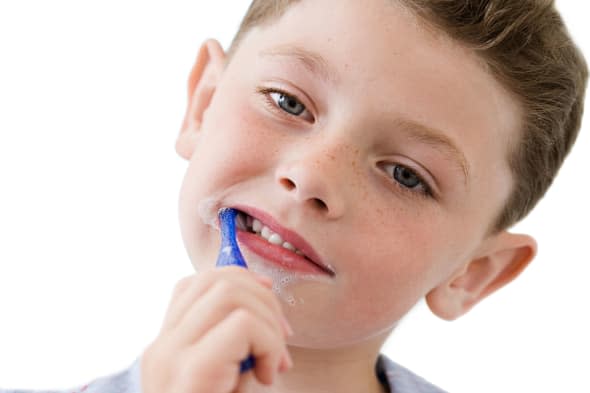Teeth care for kids

Pic: jupiterimages
Starting your children off on the right path is vital when it comes to tooth care. From teeth-cleaning to visiting the dentist and extra protection from decay, here's how to get your little one's dental routine started the right way.
Related Searches
First teeth
The milk teeth commonly appear at around six months, and the twice daily teeth-cleaning can begin even at this early age. Many mums and dads find it is easiest at this stage to use a piece of muslin wrapped around the finger with a tiny smear of toothpaste, which can be rubbed around the teeth. If and when you decide to use a brush, choose one with soft bristles of differing lengths.
By the time he or she hits two and a half years of age, all 20 of the milk teeth should be through. Starting early will ensure that your child gets used to the process and could save you a few tantrums as they grow older. Up until the age of three, it is important to use a toothpaste that contains 1,000ppm (parts per million) of fluoride. Be careful not to let your child swallow the paste, as it can be harmful. For this reason you may want to steer clear of the fruit-flavoured varieties that might tempt your little one to consider it a sweet treat!
Cleaning regime
Between the ages of three and six, a pea-sized amount of paste containing 1,350 to 1,500ppm fluoride can be used, and the brushing regime should allow for two minutes, twice a day. You can encourage your child to spit out the excess toothpaste, but rinsing with too much water will stop the fluoride from doing its best work.
In these early years, it is usually best for you to do the brushing, so that you can ensure it is being done properly, and experts recommend supervision, at the very least, until children are seven or eight years old, by which time they should be well used to the proper routine.
Guiding your little one's hand, if they are keen to do the brushing themselves, will help them to learn the proper movement (gentle, circular motions), and a mirror will also let them see where and how to complete the task properly. Try not to make the process a chore, but a fun part of the bedtime routine. You could even set a timer to make sure their teeth get the full two-minute treatment.
The dentist
NHS dental treatment is free to all under-18s, and you can register your baby with a dentist as soon as they are born. When the first milk teeth begin to appear, it's an idea to book an appointment, not least to get your little one used to the environment and the dentist themselves. Dental checks, even at this early age, are useful to identify any possible decay or health problems.
Taking your child along to one of your own appointments is an option for those that have no fear of the dentist, but if you feel anxious about dental treatment yourself, it is best to book a separate appointment - you don't want to pass your fears on to your child!
Extra protection
According to the NHS, all children from the age of three can take advantage of fluoride varnishing to help prevent tooth decay. This thin layer of varnish can be applied to either baby or adult teeth, and the fluoride will help to strengthen tooth enamel, thereby preventing tooth decay. It can be reapplied every six month.
%VIRTUAL-AFCSponserAds%
A further option offered by dentists are fissure sealants. Usually applied to a child's permanent back teeth, the sealant goes onto the chewing surfaces to keep them germ and food particle free, and just one application can last as long as five to ten years.
Looking after your child's teeth and taking them for regular check-ups at the dentist's will not only help to keep their pearly whites in good condition, it will also instil a regular routine that (hopefully) they will stick to into adulthood.
Did you struggle with getting your kids to brush properly? What advice would you give to other parents? Leave your comments below...




